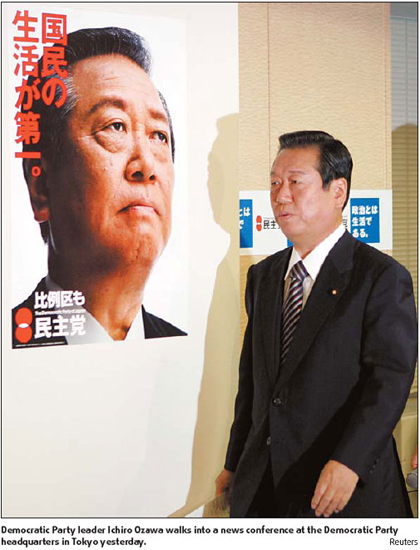The leader of Japan's largest opposition party Ichiro Ozawa Sunday offered to resign as president of Democratic Party of Japan (DPJ), a move likely to change near political pictures in Japan.
The 65-year-old politician told a press conference that he quitted to "take responsibility for causing confusion within the party" at the party headquarters on Sunday. Ozawa said he has submitted a resignation to the party Secretary-General Yukio Hatoyama.
Ozawa has been under criticism for not immediately rejecting a proposal from Japanese Prime Minister Yasuo Fukuda to form a ruling coalition with the governing Liberal Democratic Party (LDP) on Friday at a meeting between them.
The DPJ chief rejected the alliance proposal over telephone with Fukuda after the idea was rebuffed at a DPJ executive meeting later Friday.
Some party members guessed that Ozawa himself might be somewhat interested in forming a grand coalition with the ruling bloc since he did not turn down the offer at once. Since the major opposition has aimed to become the ruling party to replace the LDP, such an action was rapped by some party members as well as other oppositions.
Fukuda has been seeking to make a breakthrough in the political deadlock in the parliament after the failure to pass a bill to continue Japan's refueling mission in the Indian Ocean for U.S-led antiterrorism operations in and near Afghanistan before the temporary law authorizing such operations expired November 1.
Ozawa was elected as DPJ president in April 2006 to serve out the remaining term of Seiji Maehara, who stepped down over a scandal. The veteran politician was reelected in September 2006 and led the party to an overwhelming victory in July's upper house election to grab majority for the oppositions in the House of Councilors, which has long been held by the ruling bloc.
Since then, there had been speculations that Ozawa might force the LDP to dismiss the lower house in advance and thereafter change Japan's political landscape.
Founded in April 1998, the DPJ is the second largest party in Japan after the LDP, occupying less than one-fourth of seats in House of Representatives and 119 seats in the 242-seat House of Councilors.
(Xinhua News Agency November 5, 2007)


